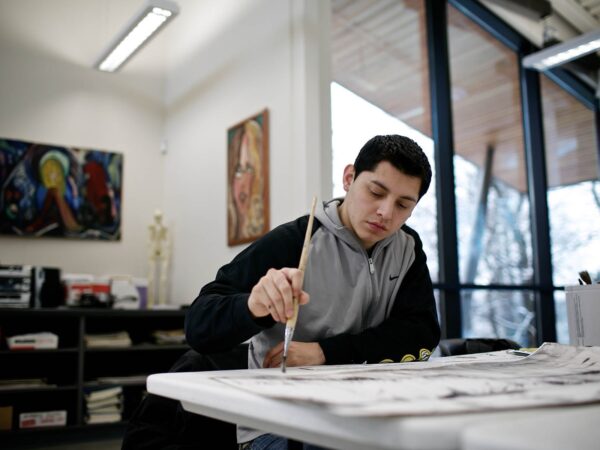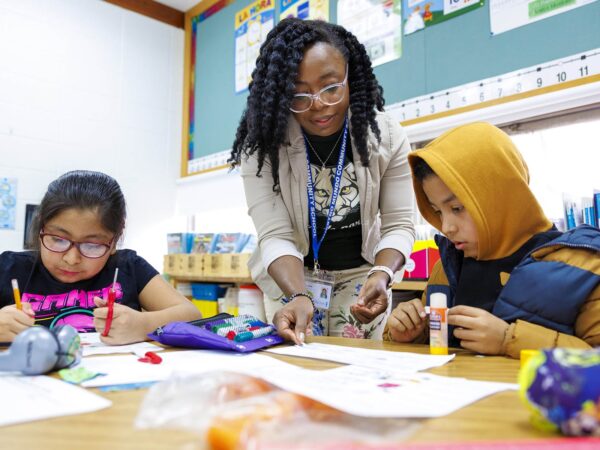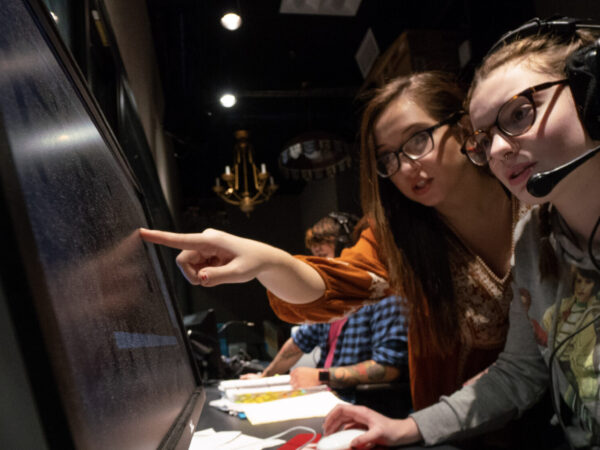Bachelor of Arts in Art TherapyCollege of Arts and Sciences
The therapeutic world of art
Art Therapy is a mental health profession that combines psychotherapeutic theories with an understanding of art materials and their affective properties. Art therapy uses art media and the creative process to help foster self-expression and coping skills.
As an Art Therapy major at Edgewood University, you will work alongside award-winning faculty who are actively engaged in field research. With active guidance in addition to state-of-the-art LEED-certified facilities, you can expect to gain knowledge in creative expression, team skills, effective communication, and commitment to using art as a form of healing. The curriculum emphasizes both theoretical and practical aspects of art therapy, encompassing supervised field experience across diverse settings, psychology fundamentals, and studio art training.
Nestled in the vibrant city of Madison, Wisconsin, Edgewood offers an inspiring environment for aspiring artists to flourish and shape their futures. With our rich cultural scene and ample opportunities for artistic exploration, we provide a nurturing and supportive setting where students can cultivate their passion for helping others through art and unlock their creative potential.
We offer a seamless path to earning both your bachelor’s and master’s degrees in art therapy, all in one place. Our master’s program is a comprehensive two year, fully online program designed to provide you with the advanced knowledge and skills needed to excel in the field of art therapy. Once you complete the master’s degree program, you will be eligible to apply for provisional art therapy registration (ATR-P) and ultimately achieve art therapy registration (ATR-BC). This specialized expertise will set you apart as a qualified and knowledgeable professional in the field of art therapy.
Madison, WI
On-campus
120
January 20, 2026
Careers in Art Therapy
$57,120
Average annual salary for an Recreational Therapist
A bachelor’s degree in art therapy prepares you for a variety of career paths. Those marked with an asterisk (*) require a master’s level degree.
- Art Therapist*
- Occupational Therapist*
- Special Education Teacher*
- Speech Language Pathologist*
- Substance Abuse, Behavioral Disorder, and Mental Health Counselors
Art Therapy Student Spotlight

Allison Clarke
Bachelor of Science in Art Therapy, Psychology minor, ’24 Fra Angelico Award Winner
“I’m incredibly thankful to be given the opportunity to work with and learn from the remarkable art professors at Edgewood and to create in a space as wonderful as The Stream. I miss the days I spent with paint on my hands, dried clay under my nails, and the glow of the sun lighting up the room. Edgewood University is grounds for inspiration, whether it be the ecological design of The Stream, the wooded lakeside landscape, or the effigy mounds outside its doors. It’s been my escape.”
Featured Courses
Art 240 Introduction to Art Therapy
This course introduces students to the rapidly expanding field of art therapy with emphasis on the breadth and scope of its practice both in the United States and globally. Art therapists practice in a wide range of settings and with people of all ages and backgrounds–such as hospitals, schools, treatment programs for adolescents, nursing homes, mental health clinics, and juvenile detention centers and prisons and mobilize to respond to disasters at the international level. Classroom lecture and discussion are integrated with direct, hands-on experience with art media and the creative process. Students will explore expressive therapy approaches to personal growth and development while they are introduced to issues regarding practice in the helping professions. No special skills or abilities with art media are required.
Contemporary sculptural techniques, concepts, and expressions. Emphasis is on the student’s ability to use various media as a means to express personal concepts.
Psychology 330 Death, Living losses, and Grief
This course will provide students with a deeper understanding of loss and grief through the lifespan. Using a bio-psycho-social-cultural perspective, the course will delve into both death and non-death/living losses. Additionally, the course will explore and critique theories and tasks related to grieving. Students will learn about grieving as an adaptive process, as well as understand risks related to complicated and prolonged grief. This course seeks to provide opportunities for each student to develop a keen and deeper appreciation of their lives by examining existential phenomenon as death, loss, grief, and resiliency.
Edgewood University Art Therapy Students
Introducing Edgewood University Art Therapy Students (ECATS), a supportive organization for students interested in art therapy. Whether you’re majoring in art therapy or simply curious about its potential, ECATS offers a community to explore the field, connect with peers, and engage in art therapy activities and discussions. Join us to discover the transformative power of art in therapy and be part of a creative and compassionate community at Edgewood University.
Faculty Spotlights
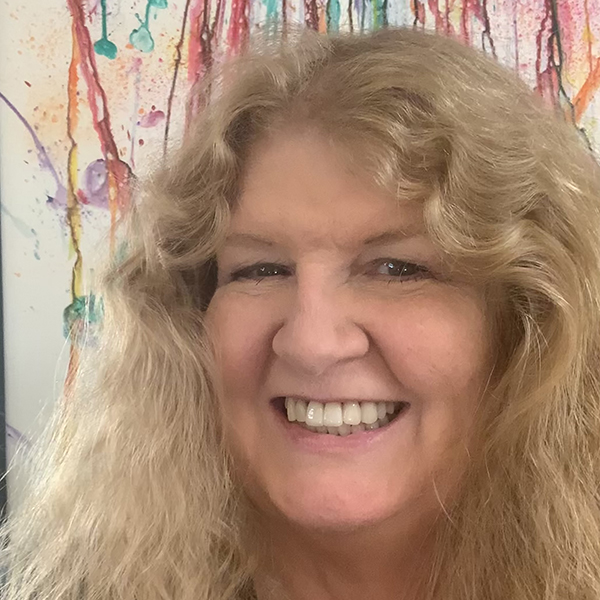
Jill McNutt
Director of the Master of Art Therapy Program
JMcNutt@edgewood.edu

Leara Glinzak
Clinical Coordinator
LGlinzak@edgewood.edu
Fra Angelico Financial Award
In honor of Fra Angelico, a monetary award is given to an exemplary senior majoring in art. This is an extraordinary student who embodies the highest standards of the art program and the values of Edgewood University through their artistic excellence, academic curiosity, and community engagement.
Dominican Friar and artist Fra Angelico (1395-1455) was an Italian painter of the Early Renaissance. He is most well-known for his frescos on the walls of the monastery of San Marco in Florence including The Annunciation and St. Dominic at the Cross (1438 – 50) which appear in the Dormitory Corridors as aids to meditation and prayer.
Related Programs
-
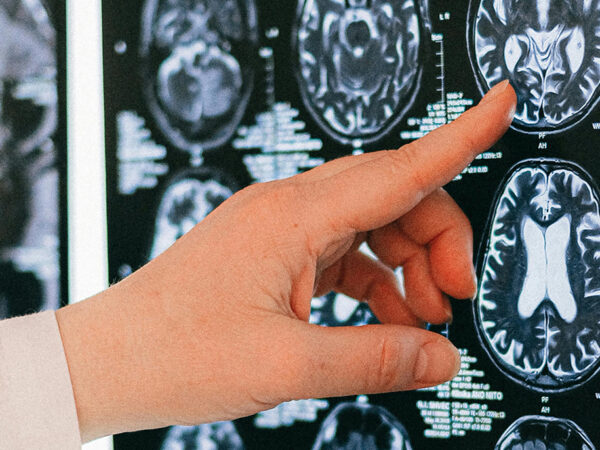
On-campus
Bachelor of Science in Neuroscience -
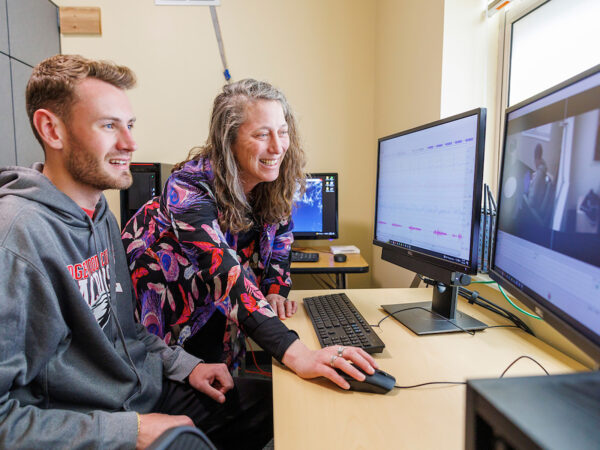
On-campus
Bachelor of Science in Psychology -
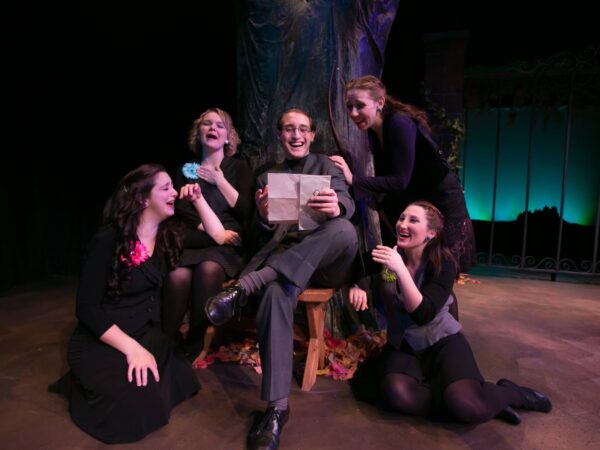
On-campus
Bachelor of Arts in Theatre Arts
Frequently Asked Questions
Where do Art Therapists find work?
Art therapists with a bachelor’s degree often find employment in various settings such as
community centers, senior centers, retirement facilities, educational institutions, after-school programs, and through hospital artist residencies. Additionally, graduates are well-equipped to apply competitively for master’s degree programs in art therapy, further enhancing their expertise and career opportunities in the field.
